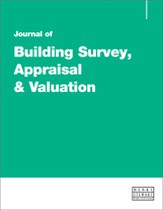Avoidance and diagnosis of problems associated with internal wall insulation
Abstract
Improving energy efficiency and comfort of traditional buildings affects how moisture moves through the building fabric. Internally insulating solid masonry walls can have a hugely positive impact on comfort, but doing so without regard for this relationship can lead to undesirable consequences, including trapped moisture and mould growth. A well-designed specification informed by a good understanding of the building and its context will preclude any unintended consequences.
The full article is available to subscribers to the journal.
Author's Biography
Matthew Smith is technical manager for Natural Building Technologies, focusing on energy efficiency for traditional buildings. An expert in moisture transfer in porous building materials, and student of building conservation, he sits on the UK Centre for Moisture in Buildings technical working group for monitoring and modelling moisture in buildings.
Citation
Smith, Matthew (2017, June 1). Avoidance and diagnosis of problems associated with internal wall insulation. In the Journal of Building Survey, Appraisal & Valuation, Volume 6, Issue 1. https://doi.org/10.69554/DQAB5765.Publications LLP
